At El Salvador Divers we teach all the standard PADI courses from the entry level course, PADI Open Water Diver, right up to the first professional level course, PADI Divemaster, all of which will earn you a Personal Identification Card (PIC). This PIC will enable you to dive at any dive centre anywhere in the world with no further training. We also run non-certifiable courses for those who do not wish to continue diving but just want to try out one of the best things to do in the water. These are the PADI Skin Diving course, for snorkellers, and the PADI Discover Scuba Diving course for instructor guided dives, (see General Dives page).
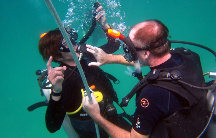 Instructor with a student performing a Controlled Emergency Swimming Ascent (CESA).
Instructor with a student performing a Controlled Emergency Swimming Ascent (CESA).
The PADI (Junior) Scuba Diver course is a sub set of the PADI (Junior) Open Water Diver Course. PADI (Junior) Scuba Divers are trained to dive under the DIRECT supervision of a PADI DiveMaster, Assistant Instructor or Instructor to a maximum of 12m. PADI Scuba Divers have more theoretical background and better developed water skills than the PADI Discover Scuba Diving participants but are NOT qualified for Independent diving.
PADI(Junior)Open Water Diver
(Min age 10 years)
This is the PADI entry level dive course. It will get you certified as an Open Water Diver and you will be issued with a Personal Identification Card (PIC) confirming you have successfully completed the PADI Open Water Diver course. This PIC will allow you to dive anywhere in the world without any further training to a depth of 18m.
The course consists of three parts:
- Knowledge Development
- Confined Water training
- Open Water training – in the lake at Ilopango
Knowledge Development consists of individual study of your own PADI Open Water Diver course manual, which you keep, and watching the associated video. There are knowledge reviews, quizzes and a final exam that have to be completed successfully.
Confined Water Training comprises of 5 ‘dives’ in shallow water, usually a swimming pool or a sheltered bay with similar conditions. These dives will get you used to the dive equipment, it’s assembly, use and care. You will learn all the skills needed to dive safely and how to operate in a ‘buddy’ system whilst diving.
Open Water Training is performed at various dive sites up to a maximum depth of 18m (12m for Juniors). During these 4 dives you will put the confined water training into practice and also complete many additional dive flexible skills.
The only prerequisite is to be over the age of 10. (10 – 14 years old earn a Junior Open Water Diver certification).
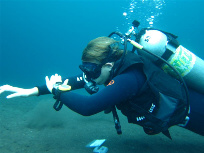 Underwater Navigation dive.
Underwater Navigation dive.
PADI (Junior) Adventure Diver
The PADI (Junior) Adventure Diver course is a subset of the Advanced Open Water Diver course and comprises of three logged adventure dives.
For other available PADI Adventure dives please visit www.PADI.com
PADI(Junior)Advanced Open Water Diver
(Min age 14 years)
Continued Education in diving encompases the Adventures in Diving program. To get certified as PADI Advanced Open Water Diver you must complete 5 adventure dives which must include a deep dive and an underwater navigation dive. In addition to these two adventure dives you can choose any three from the following adventure dives offered by El Salvador Divers.
- Wreck Dive
- Boat Dive
- Drift Dive
- Enriched Air / Nitrox
- Search and Recovery
- Underwater Naturalist
- Underwater Photography
- Altitude Dive
- Peak Performance Buoyancy
Other adventure dives are offered by other schools and can be counted towards the Advanced Open Water Diver certification.
To be classed as an adventure dive you must complete the knowledge review successfully and have the instructor sign off in your log book.
Prerequisite is to have a PADI Open Water Diver certification or an equivalent entry level diver certification.
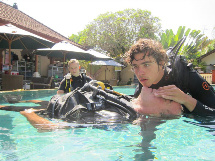
Rescuing an unresponsive diver.
PADI(Junior)Rescue Diver
(Min age 12 years)
The PADI (Junior) Rescue Diver teaches you how to help yourself and other divers if they get into trouble. It covers how to assist panicking and unresponsive divers underwater and on the surface by bringing the diver to the surface and administering rescue breaths with and without a pocket mask. You are taught how to conduct a search for a missing diver and how to construct an Emergency Action Plan for any dive site.
Before being certified as a PADI (Junior) Rescue Diver you must complete the EFR Primary and Secondary Care Course. This is available from El Salvador Divers or can be done before you start the PADI (Junior) Rescue Diver Course.
Many people say this is the most fun course that PADI run.
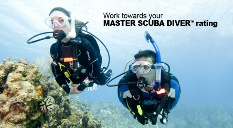
PADI(Junior)Master Scuba Diver
(Min age 12 years)
The highest recreational diver rating.
To obtain this rating you must be certified as a PADI (Junior) Advanced Open Water Diver, a PADI (Junior) Rescue Diver, have 5 PADI Speciality or PADI TecRec certifications and have logged at least 50 dives.
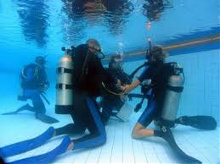 DiveMaster (on left) assissting with a confined water dive.
DiveMaster (on left) assissting with a confined water dive.
For more information on continuing your professional career go to www.PADI.com
PADI DiveMaster
The First PADI Professional Qualification
The PADI DiveMaster course is available to anyone over the age of 18 who has the PADI Advanced Open Water Diver and Rescue Diver qualifications, logged 40 dives, EFR Primary and Secondary Care training within 24 months, and has been medically cleared for diving within 12 months.
This course is usually done as an internship where the trainee works at the dive centre for an extended period, whilst learning all aspects of the dive business, not just the dive skills.
Once qualified as a PADI DiveMaster you are a dive professional and can then earn a living doing what you love – DIVING.
The next step will be to progress up the professional ladder which ultimately leads to becoming a Course Director.